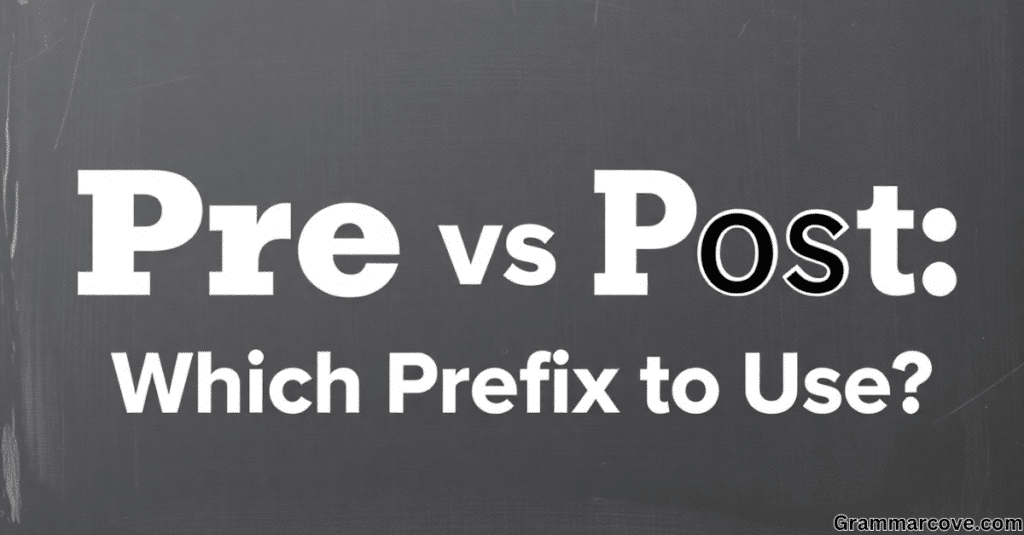When it comes to writing, using the right prefix can significantly change the meaning of a word and clarify the message you’re trying to convey. The “pre-” and “post-” prefixes are among the most commonly used in the English language. Understanding pre-vs-post-which-prefix-to-use is essential, especially when dealing with time-sensitive situations, as these prefixes help establish a clear timeline and order of events. Whether you’re preparing for something ahead of time or addressing something that happens afterward, choosing the correct prefix can make all the difference in your communication.
This article will dive deep into the meanings, usage, and pre vs post difference while offering practical examples to help you master these prefixes.
What Do Pre and Post Mean?
The Meaning of “Pre-“
The prefix “pre-“ comes from the Latin word “prae,” which means “before.” It indicates something that happens prior to a particular event or time. The “pre-“ prefix helps establish that the action or event occurs before something else.
Examples:
- Pre-heat the oven: Heating the oven before putting the food inside.
- Pre-order books: Ordering books ahead of their official release date.
The Meaning of “Post-“
On the other hand, “post-“ comes from the Latin word “post,” meaning “after.” It signifies that something happens following or after a particular event or time.
Examples:
- Post-party cleanup: The cleanup that occurs after a party has ended.
- Post-surgery care: Care or treatment that occurs after a surgery.
The distinction between pre- and post- is rooted in the order of events—“pre-“ indicates a before action, while “post-“ indicates an after action.
Pre vs Post: The Key Difference
The Pre vs Post difference is simple but critical to effective communication. The main distinction is:
- Pre- refers to events or actions that happen before something.
- Post- refers to events or actions that happen after something.
Key Differences:
| Prefix | Meaning | Example | Used When |
|---|---|---|---|
| Pre- | Before | Pre-order books | When something happens before a specific event or time. |
| Post- | After | Post-party cleanup | When something happens after a specific event or time. |
Understanding this difference ensures your writing is clear, especially when discussing timelines, schedules, or events that need a chronological order.
Historical Origins of Pre and Post
The prefixes “pre-“ and “post-“ have their origins in Latin, which influences many English words. Historically, the use of “pre-“ and “post-“ can be traced back to classical Latin, where “prae-“ and “post-“ both conveyed the ideas of time and sequence.
For instance, in Latin:
- “Pre-“ (prae) meant before.
- “Post-“ (post) meant after.
Their use in English has remained quite consistent over time. Understanding the historical origins of pre and post helps give us a deeper understanding of how and why these prefixes are still used today.
Timeline of Pre and Post
To further understand the chronological order indicated by pre- and post-, think of them as markers on a timeline:
| Event | Pre- (Before) | Post- (After) |
|---|---|---|
| Oven Use | Pre-heat the oven | Post-cooking cleanup |
| Surgery | Pre-surgery preparation | Post-surgery care |
| Books | Pre-order books | Post-release reviews |
| Parties | Pre-party preparations | Post-party cleanup |
Each of these actions or events occurs in a specific order—pre- actions occur before the main event, while post- actions occur after.
Pre vs Post: When to Use Each Prefix
1. Using “Pre-” in Everyday Life
The pre-vs-post-which-prefix-to-use when something happens ahead of time or in advance of another event. Here are a few common examples:
Pre-Order Books
Let’s say you’re an avid reader and a new book by your favorite author is being released soon. To ensure you get a copy, you might pre-order it from your favorite bookstore. By doing so, you’re ensuring that you’ll receive the book before it’s available to the general public.
Example: “Hi Sarah,
I just wanted to let you know that I’ve pre-ordered the new book by J.K. Rowling, so I’ll be getting it the day it comes out!”
Pre-Med Courses
If you’re planning to attend medical school, you would need to take certain pre-med courses. These courses typically cover essential subjects like biology, chemistry, and physics, helping you prepare for the rigorous demands of medical school.
Example: “John,
I noticed you’re interested in going to medical school. You’ll need to complete some pre-med courses before you can apply.”
Pre-Heat the Oven
One of the first steps in baking is to pre-heat the oven. This is done before you start cooking to ensure the oven is at the proper temperature when you put your food in.
Example: “Mom,
Don’t forget to pre-heat the oven before you start baking the cookies!”
2. Using “Post-” in Everyday Life

The post- prefix is used when something happens after a particular event or time. Here are a few common scenarios where post- is used:
Post-Workout Analysis
After a workout, many athletes and fitness enthusiasts perform a post-workout analysis. This involves reflecting on how the workout went, what went well, and what can be improved in future sessions.
Example: “Tom,
We need to schedule a post-workout analysis to see how we can improve your strength training routine.”
Post-Party Cleanup
After throwing a party, a post-party cleanup is inevitable. It includes tasks like washing dishes, picking up trash, and putting everything back in place.
Example: “Hey Alice,
The party was amazing! But now we need to start the post-party cleanup. Let’s get started!”
Post-Surgery Care
After undergoing surgery, it’s important to receive post-surgery care. This includes following the doctor’s instructions, taking medications, and attending follow-up appointments to ensure proper healing.
Example: “James,
After your knee surgery, make sure to follow the post-surgery care instructions carefully to ensure a quick recovery.”
Table: Summary of Pre and Post Usage
| Prefix | Meaning | Examples | When to Use |
|---|---|---|---|
| Pre- | Before, Ahead of Time | Pre-order books, Pre-heat the oven, Pre-med courses | When something happens before another event or time. |
| Post- | After, Following | Post-workout analysis, Post-surgery care, Post-party cleanup | When something happens after another event or time. |
Understanding the Pre and Post Terms in Context
The pre- and post- prefixes are not just limited to physical actions like baking or exercising; they are also widely used in academic and professional contexts.
Pre-Enrollment for Classes
If you’re planning to attend college, you might be asked to pre-enroll for class. This involves signing up for your courses before the semester officially begins, ensuring you have a spot in the classes you need.
Example: “Hi Emma,
Make sure to pre-enroll for class before the deadline to secure your spots for next semester.”
Post-Mortem Analysis
In fields like forensics, medical science, and business, a post-mortem analysis refers to an investigation or review after an event has ended. This could mean examining a deceased body (in forensic cases) or evaluating the results of a failed project (in business).
Example: “After the project failed, we need to conduct a post-mortem analysis to identify what went wrong.”
Commonly Asked Questions About Pre and Post
1. Can Pre and Post Be Used in the Same Sentence?
Yes, both prefixes can be used in the same sentence to describe actions that occur before and after the same event.
Example: “Pre-heat the oven before you start baking, and remember to do a post-party cleanup afterward.”
2. Are Pre and Post Always Used in Chronological Order?
Yes, typically pre- refers to what happens before and post- refers to what happens after. However, it’s essential to understand the context to ensure you’re using them correctly.
3. What Are Some Antonyms of Pre and Post?
- Pre-: Before, prior to, ahead of.
- Post-: After, following, subsequent to.
These antonyms are essential for understanding how the prefixes interact in a sentence and help convey timing and sequence.
Conclusion
When it comes to writing, using the right prefix can significantly change the meaning of a word and clarify the message you’re trying to convey. The “pre-” and “post-” prefixes are among the most commonly used in the English language. Understanding pre-vs-post-which-prefix-to-use is essential, especially when dealing with time-sensitive situations, as these prefixes help establish a clear timeline and order of events.
By now, you should have a solid understanding of pre-vs-post-which-prefix-to-use, their historical origins, and how they fit into everyday scenarios. So the next time you need to use a prefix, think about whether it refers to something happening before or after.


